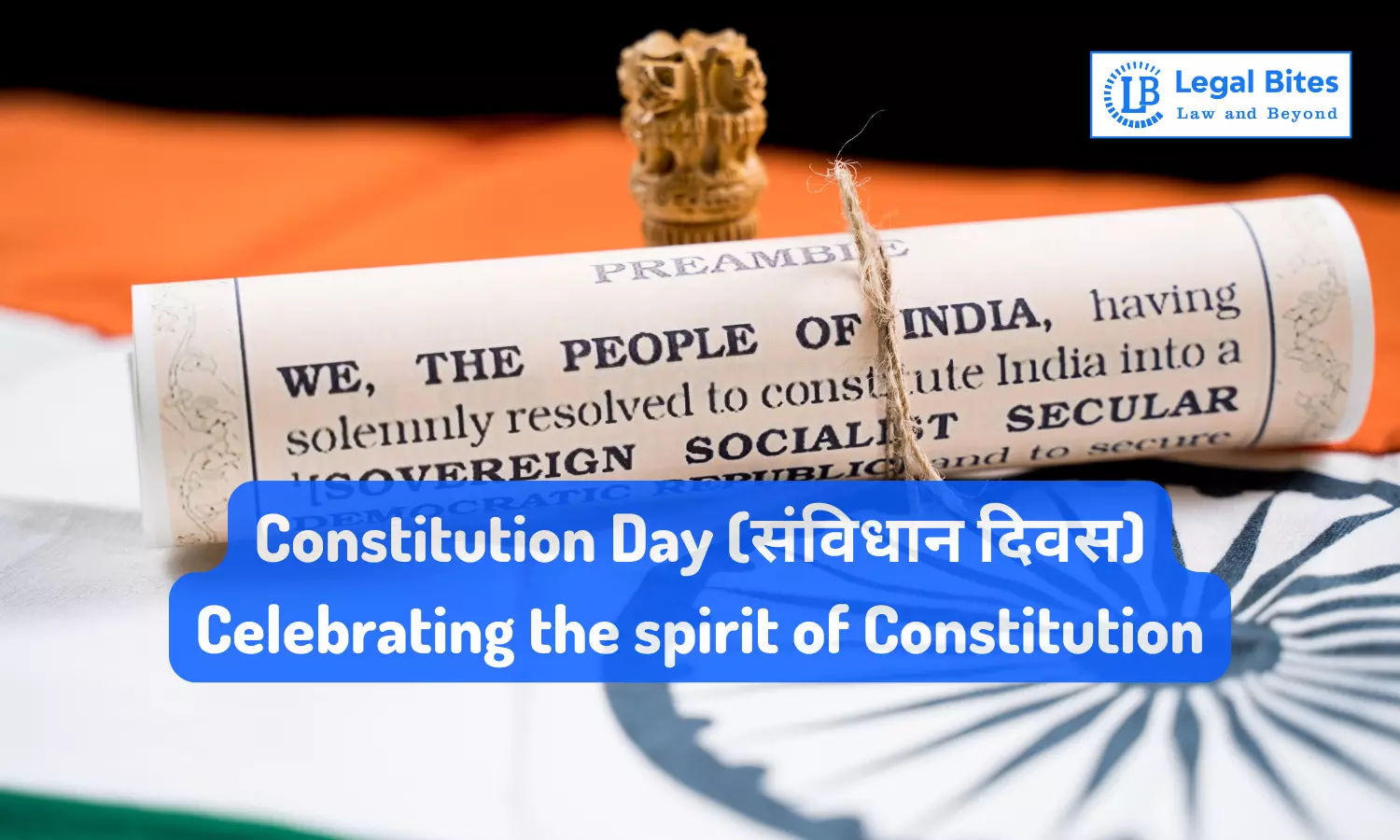Constitution Day (संविधान दिवस): Celebrating the spirit of Constitution
The article 'Constitution Day (संविधान दिवस): Celebrating the spirit of Constitution' will shed light upon the importance of celebrating Constitution Day, and its reason.

The article 'Constitution Day (संविधान दिवस): Celebrating the spirit of Constitution' will shed light upon the importance of celebrating Constitution Day, and its reason. It will also enumerate some important facts about the Indian Constitution.
Introduction
Constitution Day or Samvidhan Divas, is celebrated on 26th November. It is called so because, on this day in the year 1949, our Indian Constitution was formally enacted by the constituent assembly of India. This marks an important day, and the remarkable point is that the Indian Constitution is the longest-written constitution in the world, which was finally formulated after 2 years, 11 months, and 18 days of hard work by 389 member committee (later reduced to 299 after partition between India and Pakistan). During this period, the assembly held eleven sessions, concluding a total of 165 days. Wherein 114 days were spent on the consideration of the Draft Constitution.
Constitution Day is not a public holiday, though the government departments like the ministry of law and justice, and members of the legal fraternity like bar associations celebrate it through events and activities. The schools of the country are also engaged in organizing activities and events like quizzes, essay writing competitions, and preamble recitations for the celebration of National Law Day. Law societies, journals, and educational and awareness platforms also play a key role in conducting various competitions both online and offline, on topics that revolve around the Constitution of India. Law Universities across the country, arrange mock parliamentary debates, and essay writing competitions on the constitution and thoughts of Dr. Bhim Rao Ambedkar.
History of National Law Day
The Government of India Act, of 1935 was the Country's fundamental governing document and that was followed before the implementation of our Indian Constitution.
National Law Day wasn't celebrated until thirty years of the enactment of the Indian constitution. It was celebrated after the Supreme Court Bar Association declared 26th November as National Law Day. This day is a tribute to all the members who dedicatedly contributed towards the formation of the Constitution, the eminent member being Dr. B.R. Ambedkar, who was the chairman of the drafting committee and also considered the chief architect and Father of the Constitution of India. He studied the Constitution of more than sixty countries for drafting this Constitution.
The Indian Constitution is made by taking different parts and amending them to India's concerns and conditions from the Constitution of the following countries:
- From Australia, we developed the Concurrent list, the concept, and the Article of Freedom of trade, commerce, and intercourse, and also the Joint-sitting of the two Houses of Parliament
- From Canada, we developed the concept of a Federation with a strong Centre and Vesting of residuary powers in the Centre, we also derived the procedure of appointment of state governors by the Centre and the concept of Advisory jurisdiction of the Supreme Court.
- From Ireland, we developed directive principles of State Policy (DPSPs), the nomination of members to the Rajya Sabha, and the method of election of the president
- From Japan, we developed the concept of procedure established by law.
- From the Soviet Union (USSR) (now Russia), we developed our Fundamental duties, the Ideals of justice (social, economic, and political) in the Preamble of the Indian Constitution
- From the UK we derived the Parliamentary form of government, the concept of the Rule of Law, the Legislative procedure, the concept of Single Citizenship, the idea of the Cabinet system, the Prerogative writs, the concept of Parliamentary privileges, and, Bicameralism.
- From the US Consitution, we developed Fundamental rights, the concept of Independence of the judiciary, Judicial review, the idea, and process of impeachment of the president, the concept of removal of Supreme Court and High Court judges through the parliamentary voting procedure, and the Post of vice-president.
- From Germany (Weimar) we developed the concept of Suspension of Fundamental Rights during an emergency may it be national, financial, or state.
- From South Africa, we developed the procedure for amendment in the Indian Constitution, the election of members of the Rajya Sabha
- From France, we developed the idea of a Republic, Ideals of liberty, equality, and fraternity in the Preamble, which declares India as a sovereign, secular, socialist, and democratic republic. After all this, the Constitution assures equality, liberty, and justice for citizens.
The Preamble lays down the Pillars of the whole Constitution, it reads as follows:
"We, the people of India, having solemnly resolved to constitute India into a sovereign, socialist, secular, democratic, republic, and to secure to all its citizens:
Justice, social, economic, and political; liberty of thought, expression, belief, faith, and worship; equality of status and opportunity, and to promote among them all — fraternity assuring the dignity of the individual and the unity and integrity of the Nation; In our Constituent Assembly this twenty-sixth day of November 1949, do hereby adopt, enact and give to ourselves this constitution."
Objectives of National Law Day
The objectives of National Law Day are as follows:
- To recognize the important principles which formed the basis of the Constitution.
- To emphasize, highlight, and underline the cause of Law and its fundamental role in society.
- To rededicate ourselves to its noble ideals and sublime purposes.
- To create a linkage between Law and Justice and also to reflect and ponder inter alia on the problems and concerns of legislation, law reform, legal education, and administration of justice
- On this day we concern ourselves more purposefully with the quintessence of Law, the mission of Law, its goals and modalities, along with its efficacy and adequacy in the social context.
- To review the state of law and administration of justice,
- To suggest ways and means of improving laws and legal and judicial systems,
- To establish better and more meaningful equations between the Bench and the Bar,
- To strengthen the principle of the independence of the judiciary and the freedom of the legal profession,
- To make the legal system an effective instrument of public service.
- To maintain, reinforce and augment public confidence in the legal and judicial system.
- To create public opinion on issues of importance relating to law and judicial administration.
- To focus the attention on what ought to be priority items on the Law Agenda of the nation.
- To appraise the legal profession and its problems.
Law in integration with Constitution
This means that the laws that are being applied in society shall be in consonance with the principles and objectives of the constitution. National Law Day reminds us of the fact that whatever we do, the laws we make, and the duties we adhere to, shall be in line with the Constitution. Anything derogatory to it shall be void, illegal, or unwise. The Supreme Court has always tried to uphold the principles of the Constitution, by declaring many laws unconstitutional. When society evolves laws also need to evolve to maintain the peace and betterment of society. In adhering to this, the Apex court has also laid down many guidelines time and again, that uphold human rights, under the umbrella provision of Article 21, democracy, rule of law, and secularism, and has respected the sentiments of all people irrespective of their caste and creed.
The duty of the Supreme court is to act as a vigilant body through various amendments and execute various legislations, rules, regulations, and guidelines in acting as a vigilant officer through various legislatures and executive directives, and the duty is to streamline the functions of the three organs of the State. Therefore, we can say that the Indian Independent Judiciary has acted as a strong pillar of constitutional democracy.
On 26th January 1950, when the inaugural ceremony of the Supreme Court took place, the first Chief Justice of India, Honourable Justice Sir, Harilal J. Kania said:
"In endowing the Supreme Court of India with very wide powers, the Constituent Assembly, the Assembly representing the voice of the people through their elected representatives, has shown complete confidence in the court as the final body for dispensing justice. We hope to deserve that confidence. We trust that the people of India will also maintain the independence, honour and dignity of the Supreme Court."
National Law Day triumphs the making of the constitution by honouring its makers. Some of the important committees of the Constituent Assembly and their chairman were as follows:
- Committee on the Rules of Procedure, Finance and Staff Committee, Steering Committee - Rajendra Prasad
- Credential Committee- Alladi Krishnaswami Ayyar
- House Committee - B. Pattabhi Sitaramayya
- Order of Business Committee - K.M. Munsi
- Ad hoc Committee on the National Flag - Rajendra Prasad
- Committee on the Functions of the Constituent Assembly - G.V. Mavalankar
- States Committee - Jawaharlal Nehru
- Advisory Committee on Fundamental Rights, Minorities and Tribal and Excluded Areas - Vallabhbhai Patel
- Minorities Sub-Committee - H.C. Mookherjee
- Fundamental Rights Sub-Committee - J.B. Kripalani
- North-East Frontier Tribal Areas and Assam Excluded & Partially Excluded Areas Sub-Committee - Gopinath Bardoloi
- Excluded and Partially Excluded Areas (Other than those in Assam) Sub-Committee -A.V. Thakkar
- Union Powers Committee - Jawaharlal Nehru
- Union Constitution Committee - Jawaharlal Nehru
- Drafting Committee - B.R. Ambedkar
Conclusion
It can be concluded that Constitution Day marks the enactment of the Constitution of India. It gives us all the message to abide by our Fundamental Duties and reminds the state to provide for our uninterrupted enjoyment of fundamental rights enshrined in the Constitution. It is also celebrated to give tribute to our constitution makers who worked for almost three years to give us the beautifully drafted constitution and also overcame the partition phase ( which created riots and instability between India & Pakistan. The Constitution provides the right to constitutional remedies, that help in availing our fundamental rights when they are violated.
References
[1] Sources of Indian Constitution, Available Here
[2] National Law Day, Available Here
[3] What Happened 71 Years Ago, When the Vision of the Supreme Court Was First Laid Out, Available Here
Important Links
Law Library: Notes and Study Material for LLB, LLM, Judiciary, and Entrance Exams

